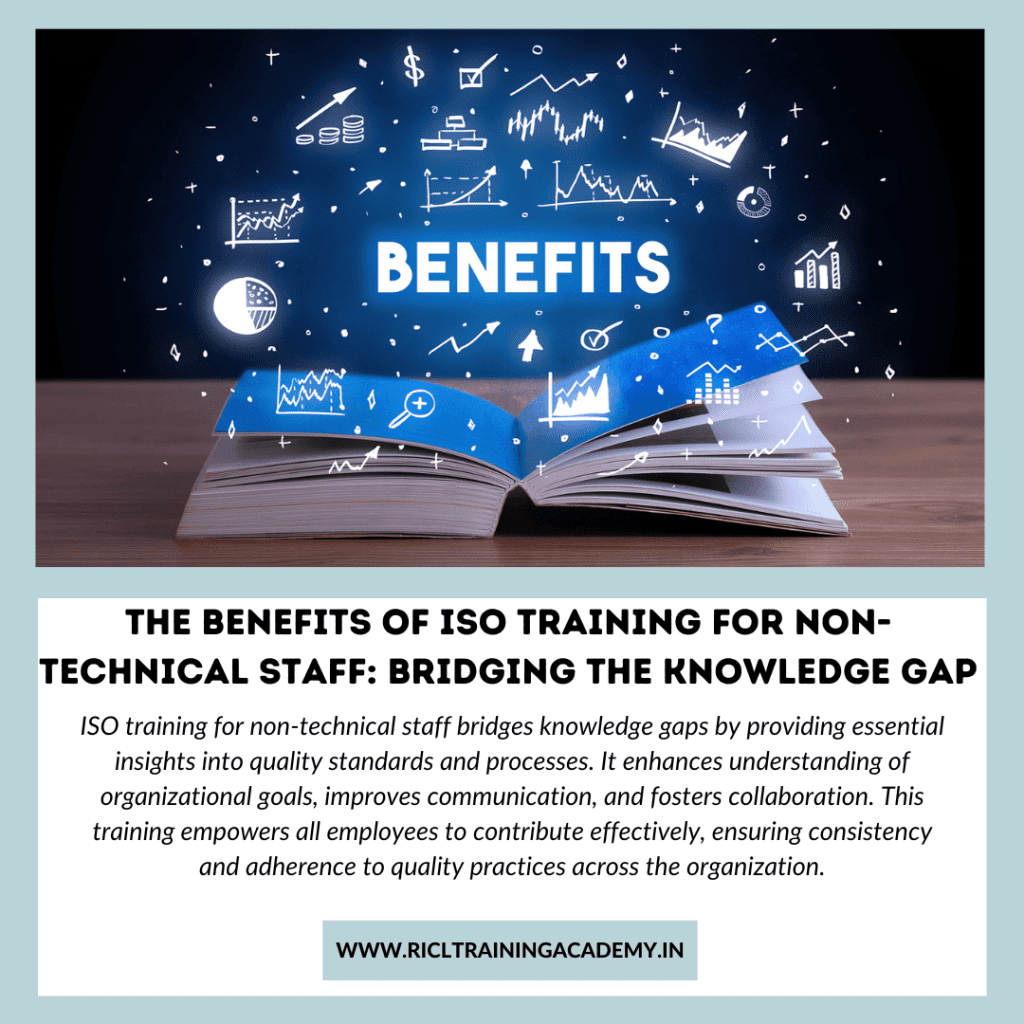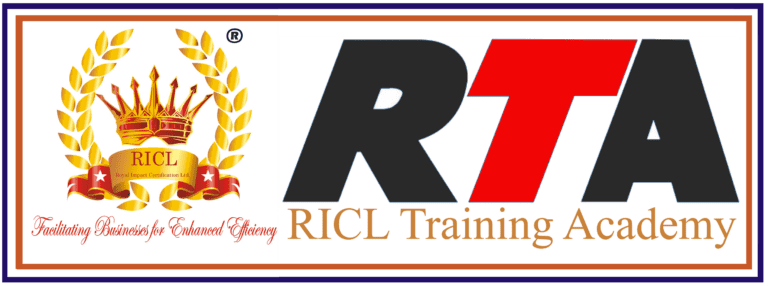The benefits of ISO training for non-technical staff. Bridge knowledge gaps, enhance skills, and improve compliance in your organization.
The Benefits of ISO Training for Non-Technical Staff: Bridging the Knowledge Gap
ISO training is often associated with technical roles and specialized functions within an organization

ISO training is often associated with technical roles and specialized functions within an organization. However, the benefits of ISO training extend beyond technical staff to encompass non-technical employees as well. Bridging the knowledge gap for non-technical staff through ISO training can enhance their understanding of quality management principles, improve operational efficiency, and contribute to a more cohesive organizational culture. Here’s an exploration of how ISO training benefits non-technical staff and why it’s crucial for organizational success.
- Enhancing Understanding of Quality Management
ISO standards, such as ISO 9001, focus on quality management systems and practices that impact all levels of an organization. For non-technical staff, ISO training provides a foundational understanding of how these standards apply to their roles and contribute to overall organizational quality.
Benefits:
- Holistic View: Non-technical staff gain a broader perspective on how their work impacts the organization’s quality management system and customer satisfaction.
- Informed Contributions: Understanding quality management principles allows non-technical employees to make informed decisions and contribute to quality improvement initiatives.
- Improving Operational Efficiency
ISO standards emphasize efficiency and effectiveness in processes. By providing ISO training to non-technical staff, organizations can improve operational efficiency and streamline workflows across all departments.
Benefits:
- Process Awareness: Non-technical staff learn about standardized processes and procedures that contribute to operational efficiency.
- Enhanced Productivity: Training helps employees understand how their roles fit into the larger process, leading to improved productivity and reduced errors.
- Facilitating Better Communication and Collaboration
ISO training fosters a shared understanding of standards and practices, which can enhance communication and collaboration among employees. Non-technical staff who are familiar with ISO standards can better align their efforts with those of their technical colleagues.
Benefits:
- Improved Coordination: Understanding ISO principles helps non-technical staff communicate more effectively with technical teams and contribute to collaborative problem-solving.
- Consistent Messaging: Training ensures that all employees use consistent terminology and practices, reducing misunderstandings and improving teamwork.
- Supporting Compliance and Risk Management
ISO standards often involve compliance with regulatory requirements and risk management practices. For non-technical staff, ISO training provides essential knowledge about compliance and risk management, helping them adhere to policies and contribute to a risk-aware culture.
Benefits:
- Regulatory Awareness: Training educates non-technical staff about relevant regulations and compliance requirements, reducing the risk of non-compliance.
- Risk Awareness: Employees become more aware of potential risks and how to mitigate them, supporting a proactive approach to risk management.
- Enhancing Customer Service and Satisfaction
ISO standards, particularly those related to quality management, focus on meeting customer needs and enhancing satisfaction. Non-technical staff, such as customer service representatives and administrative personnel, benefit from ISO training by learning how their roles impact customer interactions and satisfaction.
Benefits:
- Customer Focus: Employees gain insights into the importance of customer satisfaction and how their actions affect the customer experience.
- Improved Service: Training helps non-technical staff develop skills to handle customer inquiries and issues more effectively, leading to improved service quality.
- Promoting a Culture of Continuous Improvement
ISO standards emphasize the need for continuous improvement in processes and practices. By including non-technical staff in ISO training, organizations foster a culture of continuous improvement across all levels.
Benefits:
- Empowered Employees: Training empowers non-technical staff to identify areas for improvement and contribute ideas for enhancing processes and practices.
- Organizational Culture: A culture of continuous improvement is reinforced when all employees, including non-technical staff, are engaged in quality management efforts.
- Strengthening Team Morale and Engagement
Investing in ISO training for non-technical staff demonstrates the organization’s commitment to their professional development and the value of their contributions. This investment can enhance team morale and engagement.
Benefits:
- Professional Growth: Training provides non-technical staff with valuable skills and knowledge, contributing to their career development.
- Increased Engagement: Employees who feel valued and supported are more likely to be engaged and motivated in their roles.
- Ensuring Consistency and Standardization
ISO standards promote consistency and standardization in processes and practices. For non-technical staff, training ensures that they understand and adhere to standardized procedures, contributing to consistent outcomes and quality.
Benefits:
- Standard Practices: Training helps non-technical staff follow standardized procedures, ensuring consistency in their work and interactions.
- Quality Control: Consistent practices contribute to overall quality control and help maintain high standards across the organization.
- Building Cross-Functional Expertise
ISO training provides non-technical staff with knowledge that enhances their understanding of cross-functional processes. This knowledge helps them collaborate more effectively with other departments and contribute to integrated solutions.
Benefits:
- Cross-Training: Employees gain insights into how different functions work together, leading to more effective cross-functional collaboration.
- Integrated Solutions: Enhanced understanding of cross-functional processes supports the development of integrated solutions and more efficient workflows.
- Enhancing Organizational Reputation
An organization that invests in ISO training for all employees, including non-technical staff, demonstrates a commitment to quality and excellence. This commitment enhances the organization’s reputation with customers, partners, and stakeholders.
Benefits:
- Positive Image: Training reflects positively on the organization’s commitment to quality and continuous improvement, enhancing its reputation.
- Competitive Advantage: A reputation for high standards and excellence can provide a competitive advantage in the market.
Conclusion
ISO training for non-technical staff is a valuable investment that bridges the knowledge gap and enhances overall organizational performance. By providing non-technical employees with a solid understanding of ISO standards and their application, organizations can improve operational efficiency, foster better communication and collaboration, and support compliance and risk management.
The benefits of ISO training extend to enhancing customer service, promoting continuous improvement, and strengthening team morale. Investing in ISO training for all employees, regardless of their technical expertise, contributes to a culture of excellence and positions the organization for long-term success. Through a comprehensive approach to ISO training, organizations can ensure that every team member is equipped to contribute effectively to quality management and organizational goals.
Lead Auditor & Internal Auditor Training: QMS, EMS, OHSMS + Awareness Courses
Refine your know-how in Quality Management Systems by taking our all-inclusive Lead Auditor QMS training course. We equip you with skills necessary for effective auditing as well as ensuring conformance with ISO standards. It is an excellent resource for people who want to become professionals in QMS auditing through detailed knowledge and practical information.”
Become a certified Lead Auditor in Environmental Management Systems with our specialized training course. This program offers necessary know-how and skills for conducting effective inspections while also promoting environmental compliance according to ISO regulations. The perfect opportunity for those looking to progress their career further into the realm of environmental management”
Pursue your career growth using our Lead Auditor OHSMS training course, which is tailored towards equipping you with the skills needed to undertake comprehensive evaluations of Occupational Health and Safety Management Systems. Obtain practical capabilities as well as experience that guarantee individual workplaces’ security conformity with the most recent ISO requirements”.
Our Internal Auditor QMS training can help you improve your auditing skills. This course covers the principles and practices necessary for conducting internal audits of Quality Management Systems. Ideal for professionals looking to increase their understanding of QMS and contribute to organizational excellence.
Our Internal Auditor EMS course will help you enhance your skills in environmental auditing. Learn techniques and standards needed to implement efficient internal audits of environmental management systems, ensuring ISO compliance and its environmental sustainability.
The purpose of our Internal Auditor OHSMS training is to equip you with the necessary skills to conduct effective internal audits. This course gives an extensive overview on how to audit Occupational Health & Safety Management Systems so that you can achieve compliance and create a safe workplace.
Hone your understanding of Quality Management Systems (QMS) through our Awareness Auditor QMS. These courses provide a basic understanding of the principles, benefits and implementation strategies of QMS making them instrumental for improving quality management practices by individuals or teams.
Familiarize yourself with essential knowledge regarding the Environmental Management Systems by exploring our Awareness Auditor EMS. The courses offer an overview of the principles of EMS which will help you comprehend environmental policies and procedures along with their importance in achieving sustainability targets.
Out training programs on Occupational Health and Safety Management Systems are meant to improve your awareness in this field. This course is intended for organizations and individuals, they provide essential information on OHSMS principles and practices that lead to safer and compliant work environments.
Other Blogs
- Adaptability Thrive in a Dynamic World
- Artistic Sense Elevate Expression & Drive Innovation
- Body Language A Key Form of Non-Verbal Communication
- Business Ethics: Upholding Integrity and Sustainability
- Business Etiquette Cultivating Professionalism and Success
- Business Trend Awareness Stay Ahead & Drive Success
- Collaboration Foster Synergy for Collective Success
- Competitiveness Driving Excellence & Superior Performance
- Conflict Resolution Navigate Tensions for Positive Results
- Crisis Management Strategic Response & Communication
- Critical Thinking Empower Strategic Decisions
- Customer Service Excellence: Fostering Relationships and Driving Success
- Customizing ISO Training for Different Industry Needs: A Tailored Approach
- Dealing with Difficult People Constructive Interaction Tips
- Decision Making: Strategies for Complex Environments
- Delegation Strategic Empowerment for Success
- Design Sense Inspire Creativity & Spark Innovation
- Diplomacy Navigate Relationships & Achieve Goals
- Disability Awareness Embracing Inclusion and Empowerment
- Dispute Resolution Foster Collaboration & Harmony
- Diversity Awareness Fostering Inclusion and Collaboration
- Empathy Enhance Understanding & Build Stronger Connections
- Entrepreneurial Thinking Cultivating Innovation and Initiative
- Facilitation Enhance Group Dynamics Effectively
- Feeling Stagnant in Your Career? Start Here
- Giving Feedback Bridging Performance Gaps Effectively
- Humor A Universal Aspect of Human Experience
- Inspiring Cultivate Authentic Leadership
- Interviewing Skills Effective Communication in Recruitment
- ISO 14001 Lead Auditor Courses PDF Download
- ISO 14001 Lead Auditor Courses Study Material
- ISO 14001: Environmental Management Training Essentials
- ISO 22301 Internal Auditor Courses Material Download
- ISO 22301 Lead Auditor Courses Fees
- ISO 22301 Lead Auditor Courses Material Download
- ISO 22301 Lead Auditor Courses PDF Download
- ISO 30000 Internal Auditor Courses Material Download
- ISO 37001 Lead Auditor Courses PDF Download
- ISO 37001 Lead Auditor Courses Study Material
- ISO 41001 Internal Auditor Courses Material Download
- ISO 41001 Lead Auditor Courses Material Download
- ISO 41001 Lead Auditor Courses PDF Download
- ISO 41001 Lead Auditor Courses Study Material
- ISO 45001 Internal Auditor Courses Material Download
- ISO 45001 Lead Auditor Courses Fees
- ISO 45001 Lead Auditor Courses Material Download
- ISO 45001 Lead Auditor Courses PDF Download
- ISO 45001 Lead Auditor Courses Study Material
- ISO 50001 Internal Auditor Courses Material Download
- ISO 50001 Lead Auditor Courses Fees
- ISO 50001 Lead Auditor Courses Material Download
- ISO 50001 Lead Auditor Courses PDF Download
- ISO 50001 Lead Auditor Courses Study Material
- ISO 50001 Energy Management Training for Sustainability
- ISO 9001 Certification A Comprehensive Training Guide
- ISO 9001 Internal Auditor Courses Material Download
- ISO 9001 Lead Auditor Certificate Course
- ISO 9001 Lead Auditor Certification in India
- ISO 9001 Lead Auditor Courses Benefits
- ISO 9001 Lead Auditor Courses Cost
- ISO 9001 Lead Auditor Courses Exam Question and Answers
- ISO 9001 Lead Auditor Courses Fees
- ISO 9001 Lead Auditor Courses Fees
- ISO 9001 Lead Auditor Courses Fees in Chennai,Noida,Delhi
- ISO 9001 Lead Auditor Courses PDF Download
- ISO 9001 Lead Auditor Courses Study Material
- ISO Certification in Delhi NCR
- ISO Certification in India
- ISO Certification in Noida
- ISO Full Form
- ISO Lead Auditor Training Near Noida
- ISO Training for New Employees: Onboarding and Integration Best Practices
- Latest ISO Training Courses & Certificates
- Lead Auditor Certification
- Lead Auditor Course
- Lead Auditor ISO 14001 Course
- Lead Auditor ISO 22000 Course
- Lead Auditor ISO 45001 Course
- Lead Auditor ISO 9001 Course
- Lead Auditor Online Courses
- Lead Auditor Salary
- Lead Auditor Training
- Lead Auditor Training Provider in Delhi
- Lead Auditor Training Provider in India
- Lead Auditor Training Provider in Noida
- Listening The Cornerstone of Effective Communication
- Adaptability Thrive in a Dynamic World
- Artistic Sense Elevate Expression & Drive Innovation
- Body Language A Key Form of Non-Verbal Communication
- Business Ethics: Upholding Integrity and Sustainability
- Business Etiquette Cultivating Professionalism and Success
- Business Trend Awareness Stay Ahead & Drive Success
- Collaboration Foster Synergy for Collective Success
- Competitiveness Driving Excellence & Superior Performance
- Conflict Resolution Navigate Tensions for Positive Results
- Crisis Management Strategic Response & Communication
- Critical Thinking Empower Strategic Decisions
- Customer Service Excellence: Fostering Relationships and Driving Success
- Customizing ISO Training for Different Industry Needs: A Tailored Approach
- Dealing with Difficult People Constructive Interaction Tips
- Decision Making: Strategies for Complex Environments
- Delegation Strategic Empowerment for Success
- Design Sense Inspire Creativity & Spark Innovation
- Diplomacy Navigate Relationships & Achieve Goals
- Disability Awareness Embracing Inclusion and Empowerment
- Dispute Resolution Foster Collaboration & Harmony
- Diversity Awareness Fostering Inclusion and Collaboration
- Empathy Enhance Understanding & Build Stronger Connections
- Entrepreneurial Thinking Cultivating Innovation and Initiative
- Facilitation Enhance Group Dynamics Effectively
- Feeling Stagnant in Your Career? Start Here
- Giving Feedback Bridging Performance Gaps Effectively
- Humor A Universal Aspect of Human Experience
- Inspiring Cultivate Authentic Leadership
- Interviewing Skills Effective Communication in Recruitment
- ISO 14001 Lead Auditor Courses PDF Download
- ISO 14001 Lead Auditor Courses Study Material
- ISO 14001: Environmental Management Training Essentials
- ISO 22301 Internal Auditor Courses Material Download
- ISO 22301 Lead Auditor Courses Fees
- ISO 22301 Lead Auditor Courses Material Download
- ISO 22301 Lead Auditor Courses PDF Download
- ISO 30000 Internal Auditor Courses Material Download
- ISO 37001 Lead Auditor Courses PDF Download
- ISO 37001 Lead Auditor Courses Study Material
- ISO 41001 Internal Auditor Courses Material Download
- ISO 41001 Lead Auditor Courses Material Download
- ISO 41001 Lead Auditor Courses PDF Download
- ISO 41001 Lead Auditor Courses Study Material
- ISO 45001 Internal Auditor Courses Material Download
- ISO 45001 Lead Auditor Courses Fees
- ISO 45001 Lead Auditor Courses Material Download
- ISO 45001 Lead Auditor Courses PDF Download
- ISO 45001 Lead Auditor Courses Study Material
- ISO 50001 Internal Auditor Courses Material Download
- ISO 50001 Lead Auditor Courses Fees
- ISO 50001 Lead Auditor Courses Material Download
- ISO 50001 Lead Auditor Courses PDF Download
- ISO 50001 Lead Auditor Courses Study Material
- ISO 50001 Energy Management Training for Sustainability
- ISO 9001 Certification A Comprehensive Training Guide
- ISO 9001 Internal Auditor Courses Material Download
- ISO 9001 Lead Auditor Certificate Course
- ISO 9001 Lead Auditor Certification in India
- ISO 9001 Lead Auditor Courses Benefits
- ISO 9001 Lead Auditor Courses Cost
- ISO 9001 Lead Auditor Courses Exam Question and Answers
- ISO 9001 Lead Auditor Courses Fees
- ISO 9001 Lead Auditor Courses Fees
- ISO 9001 Lead Auditor Courses Fees in Chennai,Noida,Delhi
- ISO 9001 Lead Auditor Courses PDF Download
- ISO 9001 Lead Auditor Courses Study Material
- ISO Certification in Delhi NCR
- ISO Certification in India
- ISO Certification in Noida
- ISO Full Form
- ISO Lead Auditor Training Near Noida
- ISO Training for New Employees: Onboarding and Integration Best Practices
- Latest ISO Training Courses & Certificates
- Lead Auditor Certification
- Lead Auditor Course
- Lead Auditor ISO 14001 Course
- Lead Auditor ISO 22000 Course
- Lead Auditor ISO 45001 Course
- Lead Auditor ISO 9001 Course
- Lead Auditor Online Courses
- Lead Auditor Salary
- Lead Auditor Training
- Lead Auditor Training Provider in Delhi
- Lead Auditor Training Provider in India
- Lead Auditor Training Provider in Noida
- Listening The Cornerstone of Effective Communication

TESTIMONIALS
What Our Cutomers are Saying About us

Ruis aute irure dolor in reprehender voluptate velit esse cillum dolore fugiat pariatur sint occaecat cupidata non proie sunt in culpa aui officede









Reach us at:
info@ricltrainingacademy.in
support@ricltrainingacademy.in
sales@ricltrainingacademy.in
complaint@ricltrainingacademy.in
Call us at:
9355650992
9355650993
Visit us at:
Royal Impact Certification Limited
623 Tower -B, The Ithum Sector – 62, Noida, 201301.
Copyright © 2024 RICL Training Academy Team


